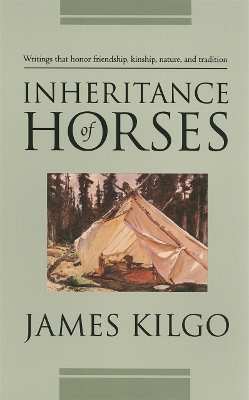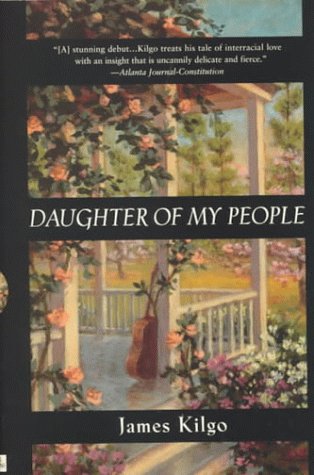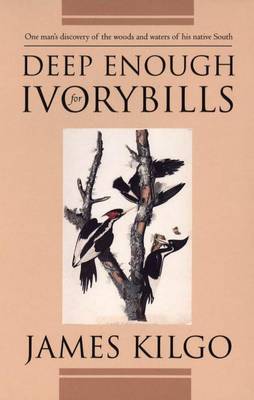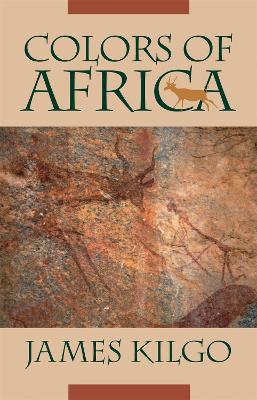Brown Thrasher Books
4 total works
Reconciliation and remembering are the forces at work in Inheritance of Horses. In these essays, James Kilgo seeks the common ground between his roles as a man, as husband and father, and as heir to his family legacy. Pausing at mid-life to make an eloquent, understated stand against our era's rootlessness, he honors friendship, kinship, nature, and tradition.
In the opening section, Kilgo focuses on the tension between his need for ritualistic male camaraderie and his familial obligations. Searching the woods for arrowheads, sitting around the dinner table at a hunting lodge, or careening down an abandoned logging road in a pickup, he seems ever-prone to the intrusions of domesticity and civilization: a sudden memory of miring the family station wagon in the sand on a beach trip, an encounter with a couple on their sixtieth wedding anniversary, a stream littered with trash and stocked with overbred hatchery trout.
Restlessness and responsibility converge and again clash in the second series of essays, in which domestic themes are explored in settings that range from Kilgo's own living room to Yellowstone Park and the deep waters off the Virgin Islands. Through such images as a hornet's nest, a gale-force storm, a grizzly bear, and a marlin, Kilgo gauges the strengths and vulnerabilities of his family and moves toward an existence that is part of, not apart from, the women in his life.
The long title essay composes the book's final section. Reading through a cache of letters exchanged between his two grandfathers, Kilgo recovers and revises his memories of them. What he learns of their open, passionate friendship reveals an essentially feminine aspect of their patriarchal natures, enriching, but also confusing, Kilgo's earlier understanding of who they were. As some of the more unhappy or unpleasant details of his grandfathers' lives come to light, they first heighten, then assuage, Kilgo's ambivalence about a family heritage built as much on myth as on truth.
The manner in which Kilgo makes such intensely personal concerns so broadly relevant accentuates what might be called the "told," rather than the "written," quality of Inheritance of Horses. He is foremost a storyteller, working in a style that is classically southern in its pacing and its feel for the land, but all his own in its restrained humor and lack of self-absorption. Guided by a storyteller's respect for common people and common feelings, Kilgo never prescribes or moralizes but rather brings us to places where principled choices can be made about what we need and value most in our lives.
This is the account of a man's initiation into the outdoors heritage of his home territory. Jim Kilgo was born and raised not to far from the bottomlands of the Great Pee Dee River in South Carolina, but it was not until he was grown that he began to respond to the powerful lure of the forests, fields, and swamplands of the South and the wildlife that inhabit them. For Kilgo, reentry into the wilderness becomes a window on the life that men can lead, within nature and out of it. His tales of hunting and fishing will delight anyone who has ever used rod or gun, yet by no means is this a book for devotees of hunting alone. What is rediscovered here illuminates the lives of human beings who, all to often unknowingly, are integrally part of the larger rhythms of nature and the seasons.
Kilgo barely knew the man who invited him to Africa. A further complication: the trip was a big-game safari, which conjured troubling images of privilege and excess. Yet he went, as an observer, for Africa had enthralled him since boyhood. Kilgo's recollections of his fellow travelers and the safari staff - their forays into the bush, visits to nearby villages, and long evening talks about nature, family, and faith - are all informed by a growing awareness of Africa's complexities and contradictions. As he reflects on the swirl of customs and beliefs all around him, as he and his traveling companions draw closer together, Kilgo measures what he has learned firsthand about Africa against his readings of those who came before him, including explorer and missionary David Livingstone, writers Ernest Hemingway and Isak Dinesen, and environmentalists Mark and Delia Owens.
Kilgo thinks often about hunting: about the days - long initiatory rites of local native hunters; the motivations, beyond money, that can drive a poacher; the carnage the animals visit on each other nightly just outside the walls of the idyllic safari compound. Near the end of his stay, he is offered the chance to hunt a kudu, the great antelope of storied elusiveness. Pondering this unexpected opportunity, Kilgo wonders: Has he connected sufficiently with this remarkable place to justify his participation in the hunt? Is he ready and, above all, is he worthy?



